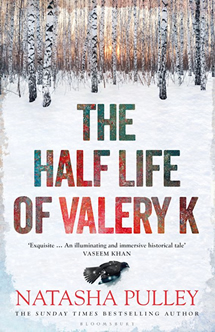Reviewed by Robert Goodman.
By Natasha Pulley, Bloomsbury.
 There has always been a large strain of historical truth in Natasha Pulley’s historical fantasy novels and appearances by historical figures. Her latest book The Half Life of Valery K is set in the 1960s, closer to the present than any of her previous books, and is not really a fantasy (although there is a little bit of wish fulfillment). It is also very definitely based on a true story, a tragic one steeped in Cold War politics.
There has always been a large strain of historical truth in Natasha Pulley’s historical fantasy novels and appearances by historical figures. Her latest book The Half Life of Valery K is set in the 1960s, closer to the present than any of her previous books, and is not really a fantasy (although there is a little bit of wish fulfillment). It is also very definitely based on a true story, a tragic one steeped in Cold War politics.
Valery Kolkhanov is just managing to survive in the gulag to which he has been sent so is right to be suspicious when he is plucked out of that prison and sent to a place called Chelyabinsk 40, or just City 40, a nuclear enrichment facility. On the way there is notices that the surrounding forest is dying from what he suspects is exposure to high levels of radiation. When he arrives, Valery finds his old University supervisor in charge of a project investigating the impact of radiation on local flora and fauna. While he is not allowed to determine how radioactive the local area is, Valery suspects that things are much worse than anyone is letting on. But the scientists and their supervisors are keen to explore the effects of radiation and work out a way to survive it in the case of a feared American nuclear attack.
Valery slowly forms a connection with the head of security whose wife works at the nuclear plant and children are starting to show the effects of radiation exposure. He starts to do what he can to alert people to the dangers of the city and its surrounds. But this is Russia in the 1960s so his efforts have little impact:
That peculiar thing was happening, the one that had happened in Leningrad when Valery was young; everyone knew one thing to be true, but everyone was obliged to keep insisting it wasn’t. Gosh, of course everyone who’s arrested is guilty. Of course Truth only prints honest-to-God truth, it’s in the name.
Of course the radiation is fine.
Valery is at first a seemingly gentle character, but he emerges as more complex with a depth of resolve that allows him to do what needs to be done. Pulley manages to deliver in Valery a character who readers can root for even though he has done, and remains capable of doing, some fairly violent acts himself.
Despite looking at a different in time period, location and subject matter and foregoing any speculative fiction elements, this is still very much a Natasha Pulley book. Which means the plot rotates around a gentle, nascent relationship between two men who have been previously persecuted for showing any feeling towards other men. But it is also a fascinating story that effectively captures a place and time and builds tension out of the story of people just trying to do the right thing in the face of a destructive or negative mindset. And there is also (unsurprisingly for Pulley fans) a cheeky octopus that has no direct impact on the plot and is there for no apparent reason other than it seems Pulley likes octopuses.
In The Half Life of Valery K, Natasha Pulley shines a light on yet another dark corner of Soviet history. As with her other books, she does not pull back from the real horrors of the situation that she is exploring. But she tells a story full of compassion and humanity. So while there are no fantasy genre elements to this book, given the view she provides of Soviet Russia, there is at least a strain of (welcome) wishful thinking in the way the narrative plays out.
Over 800 more book reviews can be found on Pile by the Bed.











